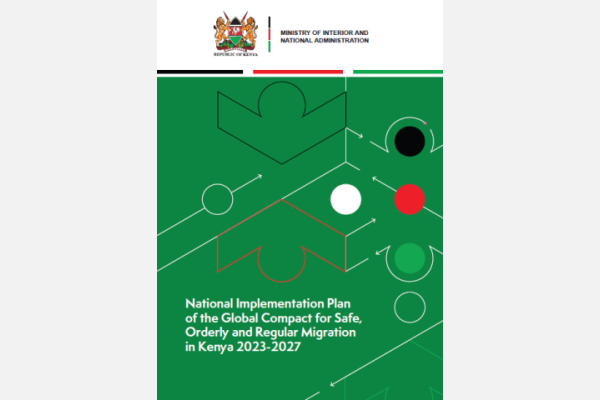Repository of Practices

Kenya GCM Implementation Plan (2023-2027)
Dates
Type of practice
Summary
The National Coordination Mechanism on Migration (NCM) in Kenya, a government led intergovernmental platform for migration governance, launched in October 2023 the Kenya Global Compact on Migration (GCM) Implementation Plan (2023-2027). The Plan is the first of its kind that has been developed support of the GCM capacity building mechanism drawing on the Network’s guidance with the generous support of the Building Migration Partnership Programme. The plan embodies the spirit of the GCM, with a 360-degree approach towards migration, having undergone extensive consultations in line with GCM whole-of-government and a whole-of-society approaches. Through thematic discussions, 88 stakeholders were consulted for this Plan including representatives from different Ministries, Department and Agencies, county representatives, faith-based organizations, civil society organizations, academia, private sector, and UN agencies. All of them contributed to the development of the different drafts, including the monitoring and evaluation framework. Kenya’s GCM Plan translates Kenya’s commitments at the International Migration Review Forum (IMRF) (2022) into proposed action by encompasses five thematic areas (TA) to catalyse GCM implementation:
TA 1: Promoting fact- based and data driven migration discourse policy and planning. GCM Interventions include developing a migration data management strategy; enhancing the capacity of state agencies on data-collection, processing & dissemination; and establishing digital migration data management infrastructure.
TA 2: Addressing the drivers of migration and mitigation situations of vulnerability in migration. GCM Interventions include supporting initiatives and programs that address the economic and livelihood drivers of migration; building resilience of communities arising from climate change; and enhancing access to social services and legal identity.
TA 3: Addressing irregular migration including through managing borders and combating transnational crimes. GCM Interventions include strengthening the implementation of the national referral mechanisms to enhance protection of vulnerable migrants; promoting coordinated and integrated border management; and strengthening community- based and cross border initiatives
TA 4: Facilitating regular migration, decent work, and enhancing the positive development effects of human mobility. GCM Interventions include supporting development and implementation of laws and policies on labour migration; increasing diaspora engagement for transfer of skills, lower cost of remittances; and enhancing protection of migrant workers.
TA 5: Improving the social inclusion and integration of migrants. GCM Interventions include operationalizing the Refugee Act 2021 and the Shirika Plan for the implementation of the Kenya Comprehensive Refugee Response Framework (CRRF); and facilitating safe and dignified voluntary return and readmission of refugees and vulnerable
Organizations
Main Implementing Organization(s)
Detailed Information
Partner/Donor Organizations
Benefit and Impact
■ Provide a roadmap into translating Kenya's GCM commitments into action
■ The GCM Implementation Plan aims to mainstream migration into national development, aligning it with global and regional aspirations, such as the Kenya Vision 2030, the Agenda 2030 and the AU Agenda 2063.
■ The Plan ensures vertical and horizontal coherence, through meaningful involvement, engagement and shared responsibility with all relevant ministries; through engaging counties
■ The Plan ensures a 360-degree vision of migration, through addressing all relevant dimensions of migration and by identifying implementation measures for the GCM objectives
■ The Plan included a Broad-based Multi-stakeholder Consultative Process
- As a result of the commitments made by Kenya at the 2022 International Migration Review Forum
- The elaborate process was initiated by Kenya expressing interest to the United Nations Network on Migration team
- Through broad-based multi-stakeholder consultative process spanning several meetings and workshops with intense consultations to develop a roadmap on how to implement the GCM agenda in Kenya.
■ Each of the priorities has a set of GCM interventions, activities and outcomes that will benefit Kenya, and more important migrants, their families and local communities by enabling a comprehensive approach towards migration.
Key Lessons
- Ensure continuity of stakeholders involved in the process, having focal points assigned to represent their agencies/organizations across the different activities.
Recommendations(if the practice is to be replicated)
- A detailed workplan should be agreed in the beginning with the leading actors.
- The creation of a country level UNNM is key to ensure the whole of system approach.
Innovation
Additional Resources
Media
Kenya GCM National Implementation Plan – Amy Pope, Coordinator of the Network's Remarks
Additional Images
Date submitted:
Disclaimer: The content of this practice reflects the views of the implementers and does not necessarily reflect the views of the United Nations, the United Nations Network on Migration, and its members.
More Related Practices:
- Kenya GCM Implementation Plan (2023-2027)
- Evaluando el Pacto Mundial para la Migración Segura, Ordenada y Regular: Propuesta de Indicadores de la Sociedad Civil
- Regional Migrant Response Plan (MRP) for the Horn of Africa and Yemen
- Regional Inter-Agency Coordination Platform for Refugees and Migrants from Venezuela (R4V)
- Media as a tool of advocacy and supporting mechanism
Peer Reviewer Feedback:
*References to Kosovo shall be understood to be in the context of United Nations Security Council resolution 1244 (1999).
Newsletter
Subscribe to our newsletter.



